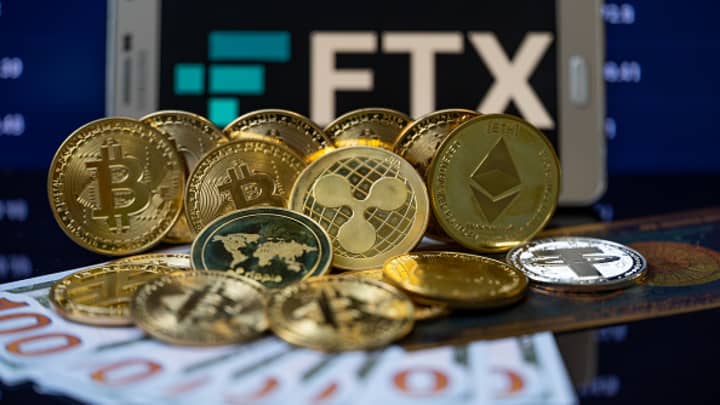
"I do want everybody to understand that the mistake here was not , the mistake was not crypto," Luthra said. "The fundamental reason why we buy bitcoin, why we use bitcoin has not changed."
Luthra said his hefty loss on FTX hasn't shaken his bitcoin bullishness.
"I know it's going to end up at over $100,000 sooner or later anyways, so for me it's a great buy," he said. Bitcoin is currently trading at about $26,900, down from a high of about $69,000 in December 2021.
"All the success is made in the trenches, not when everybody's already celebrating," he said.
FTX, once one of the largest cryptocurrency exchanges in the world, spiraled into bankruptcy after its swift collapse last year. Shortly afterward, FTX investigators said they discovered $8.9 billion in customer assets were missing from the exchange.
FTX founder and ex-CEO Sam Bankman-Fried faces of fraud and campaign finance violations. He pleaded not guilty to all charges. Jury selection begins in New York on Tuesday.
At a , an attorney for FTX said $7.3 billion in cash and liquid crypto assets had been recovered from the exchange. So far, none of the customers interviewed by CNBC have received any of their money back.
Jake Thacker, an FTX customer in Portland, Oregon, told CNBC he lost hundreds of thousands of dollars on the exchange shortly after he lost his job in the tech industry.
"I'm in quite a big hole right now," Thacker said. "I'm probably going to have to file for bankruptcy."
Thacker told CNBC he "would encourage people to still invest in crypto."
"I probably would give them some different advice at this point," he said. That advice would come with the warning: "Here's what I learned, don't make the same mistakes I did."
Bhagamshi Kannegundla said he first heard about FTX in an featuring comedian Larry David that aired during the Super Bowl.
"I was like, oh my goodness, there's all these big name people utilizing FTX," Kannegundla said. "So I was like, OK, hey, I think I'll be safe using this."
Less than a year later, Kannegundla said, he was out $174,000, representing around 60% of his crypto portfolio, from FTX's collapse.
"Based on all the other bankruptcies and everything that happened in the crypto market, I was really, really worried about getting anything back, and then how long I would have to wait," Kannegundla said.
Instead of waiting for the recoveries to eventually be distributed to FTX customers, Kannegundla went online and found a company that would help him sell his bankruptcy claim for pennies on the dollar to get a little bit of cash more quickly.
Kannegundla said his bankruptcy claim was for $174,000. He received around $19,000 in the sale.
"The buyer was, after all the due diligence and everything, it went down to like 11% of the $174,000," he said.
Years later, if the FTX bankruptcy process recovers more than the 11 cents on the dollar for his claim, the buyer pockets the difference. Kannegundla said he will have "zero regrets" if that money gets recovered because he has a different strategy.
"I wanted to get the cash from the bankruptcy claim, primarily to invest in crypto again," he said. "I felt as if there was a good chance for me to make money in the next five to 10 years."
Kannegundla said he understands that it may be an odd choice.
"People might think I'm crazy for this," he said. "After going through the FTX and all these other bankruptcies, why would you want to buy any more crypto?"
"When you believe in something as far as technology, you will go through it, you know, it's kind of like the same person who bought like, let's say stock," he said.
Another FTX customer, Sunil Kavuri, who has a background in traditional finance, said he moved his digital assets from rival exchange Binance to FTX because he believed it was a safe place for his money. He pointed to the fact that the company raised money from top venture capital firms Sequoia and Paradigm.
"I thought OK, this is a very safe, institutionally backed exchange," he said.
In an email to CNBC, Kavuri said he hasn't purchased any crypto since the collapse of FTX because he "wanted to take a break from suffering a massive loss." Over the last 10 months, he said, the majority of his time has been spent fighting "for the rights of all FTX users that lost money due to the FTX bankruptcy."
"It hasn't shaken my faith in the underlying asset itself," Kavuri said. "I think cryptocurrencies generally, it should be here to stay."
Across the industry, crypto still has its believers despite the madness of 2022.
Brett Harrison, the former president of FTX's U.S. business, said he was blindsided by his parent company's collapse. But he's doubling down on cryptocurrencies.
Harrison, who less than two months before its demise, told CNBC he "had no reason to suspect that FTX wasn't anything other than extremely profitable and in great shape" prior to his departure.
Harrison said he's been raising money to start a new company in the space called Architect Financial Technologies.
"I'd really like to build a technology and a tech-forward brokerage that allows people to trade seamlessly and easily in digital assets and any kind of other tokenized products in addition to other asset classes," Harrison said.
Anthony Scaramucci, founder of Skybridge Capital, said he felt like he was late to the game. He didn't make his first bitcoin investment until October 2020. He later started Skybridge to focus on digital assets.
Scaramucci told CNBC he "was building a close relationship with Bankman-Fried" and felt "betrayed and disappointed" when FTX collapsed after making a $10 million investment in the exchange's FTT token.
He said he still sees "a very strong bull case for Web 3," referring to broad technologies surrounding crypto and the prospective future of a distributed internet.
"You got to be patient," he said. "If you're going to go through a period of fraud, and fraudsters and over leverage, you have to see it to the other side."



